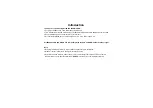
88
the right to change or modify any of the specifications without
notice or obligation to update existing units.
Exposure To Radio Frequency Signals
Your wireless handheld portable telephone is a low power
radio transmitter and receiver. When it is ON, it receives and
also transmits radio frequency
(RF) signals
In August, 1996. the Federal Communications Commission
(FCC) adopted RF exposer guidelines with safety levels for
hand-held wireless phones. Those guidelines are consistent
with the safety standards previously set by both U.S. and
international standards bodies:
•
ANSI C95.1 (1992)
•
NCRP Report 86 (1986)
•
ICNIRP (1996)
Those standards were based on comprehensive and periodic
evaluations of the relevant scientific literature. For example,
over 120 scientists, engineers, and physicians from
universities, government health agencies, and industry
reviewed the available body of research to develop the ANSI
standard (C95.1).
The design of your phone complies with the FCC guidelines
(and those standards).
Body-worn Operation
To maintain compliance with FCC RF exposure guidelines, if
you wear a handset on your body, use a Samsung supplied or
approved carrying case, holster or other body-worn
accessory. If you do not use a body-worn accessory, ensure
the antenna is at least one inch (2.5 centimeters) from your
n400bmc version 2.book Page 88 Wednesday, May 14, 2003 3:30 PM
Summary of Contents for SPH-n400 Series
Page 4: ...n400bmc version 2 book Page 4 Wednesday May 14 2003 3 30 PM...
Page 10: ...vi n400bmc version 2 book Page vi Wednesday May 14 2003 3 30 PM...
Page 114: ...104 n400bmc version 2 book Page 104 Wednesday May 14 2003 3 30 PM...
Page 119: ...n400bmc version 2 book Page 105 Wednesday May 14 2003 3 30 PM...
Page 120: ...n400bmc version 2 book Page 106 Wednesday May 14 2003 3 30 PM...
















































